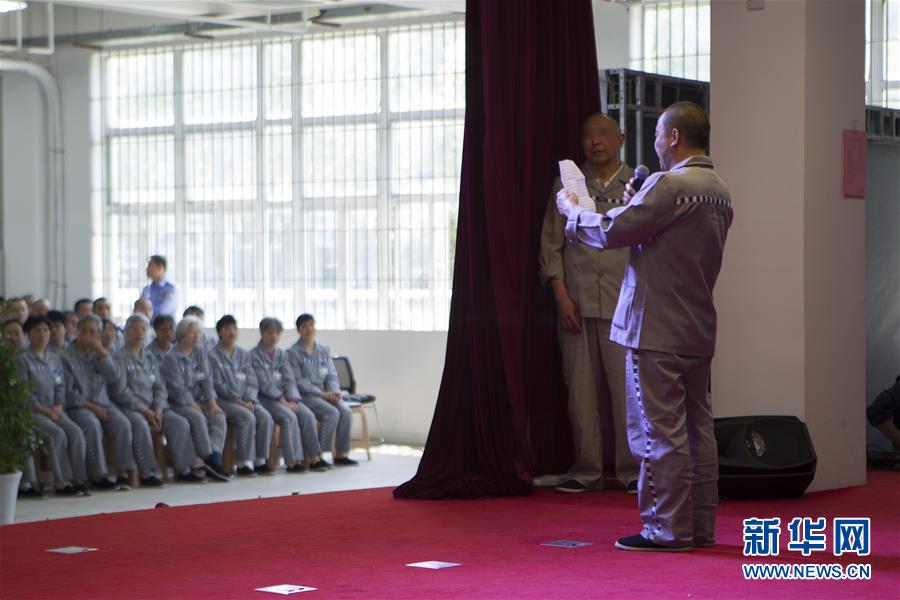


China will conduct a pilot program to enroll inmates in basic medical insurance to protect their legitimate rights, a senior justice official said.
The two-year test will be conducted in Heilongjiang, Jiangxi, Hainan, Guizhou and Shaanxi provinces and Chongqing before being rolled out nationally, Wang Jinyi, director of the Prison Management Bureau at the Ministry of Justice, said in an exclusive interview.
"We're in discussions with other authorities, including the Ministry of Finance and the Ministry of Human Resources and Social Security, and preparing to introduce a regulation to further clarify the details," he said.
Wang said most medical expenses incurred by prison inmates will be covered by the national medical insurance fund.
"Under the new measure, sectors with different tasks will improve the mechanism and work closely to better protect inmates' health rights and other legitimate rights," he added.
Although offenders' medical treatment has been listed in the State budget in accordance with Prison Law, "the guaranteed degree and level has been far from adequate due to lack of an effective mechanism and an updated regulation", Wang said.
According to the Justice Ministry, China has 1.7 million convicts serving sentences in 680 prisons, and 320,000 correctional officers. Since 2012, the average number of inmates who break out of prison has dropped to less than six a year, compared with a total of 1,000 in the 1980s and '90s.
Although the overall situation is stable in prisons, some cases involving violations of inmates' human rights, including forced labor and inadequate medical care or abuse, have been reported nationwide, attracting lots of attention from home and abroad.
"We have taken many effective measures to fully protect inmates' human rights while they serve their sentences and have adopted a zero-tolerance attitude toward any behavior infringing on their legitimate rights," Wang said.
He said the Justice Ministry has issued a notice to expand the scope of legal services that lawyers can offer to inmates and to make it easier for lawyers to meet with them while they serve their sentences.
Inmates also are to have access to prosecution offices in all prisons across the country, and inmates who think they received unjust court rulings, were treated unfairly in prison or have other suggestions can immediately report it and they will get feedback in a timely manner, he said.
Authorities have instituted more humane policies and assistance measures to treat convicts diagnosed with infectious disease, including AIDS and hepatitis, Wang added.
Since 2005, for example, Shanxi Xinkang Prison has accepted 300 inmates with AIDS, and during the past 12 years, not one case involving the viral infection or a medical dispute has occurred, according to the Ministry of Justice.
During that time, Xinkang prison implemented a thorough AIDS prevention and control policy, and asked the inmates to take advantage of information offered about the disease and preventive measures. The inmates received thorough physical examinations before they were jailed and they have had regular checkups to maintain an accurate picture of the medical situation.
"We instituted a centralized management system and offered more humane care and assistance measures," Wang said. "Officials paid great attention to their psychological care and instruction, often communicating with them about mental obstacles and life difficulties."
The prison provides free medications and takes them for anti-virus treatment at hospitals. When convicts are eligible for release on parole or probation, the prison reports their information to local disease control and prevention departments and assists with them with the convicts' care.
Wang said their primary responsibility is not only to maintain the security of prisons, preventing inmates from escaping, but also to reform and prepare them, helping them absorb more professional skills and knowledge to get them ready for a smooth return to society.
"We will classify the inmates and draw up targeted measures to reform different types of offenders based on the degree of malice and social harm involved in their crimes," he said.
"In this way, we will send law-abiding citizens into society and minimize new crimes in the future."

 Award-winning photos show poverty reduction achievements in NE China's Jilin province
Award-winning photos show poverty reduction achievements in NE China's Jilin province People dance to greet advent of New Year in Ameiqituo Town, Guizhou
People dance to greet advent of New Year in Ameiqituo Town, Guizhou Fire brigade in Shanghai holds group wedding
Fire brigade in Shanghai holds group wedding Tourists enjoy ice sculptures in Datan Town, north China
Tourists enjoy ice sculptures in Datan Town, north China Sunset scenery of Dayan Pagoda in Xi'an
Sunset scenery of Dayan Pagoda in Xi'an Tourists have fun at scenic spot in Nanlong Town, NW China
Tourists have fun at scenic spot in Nanlong Town, NW China Harbin attracts tourists by making best use of ice in winter
Harbin attracts tourists by making best use of ice in winter In pics: FIS Alpine Ski Women's World Cup Slalom
In pics: FIS Alpine Ski Women's World Cup Slalom Black-necked cranes rest at reservoir in Lhunzhub County, Lhasa
Black-necked cranes rest at reservoir in Lhunzhub County, Lhasa China's FAST telescope will be available to foreign scientists in April
China's FAST telescope will be available to foreign scientists in April